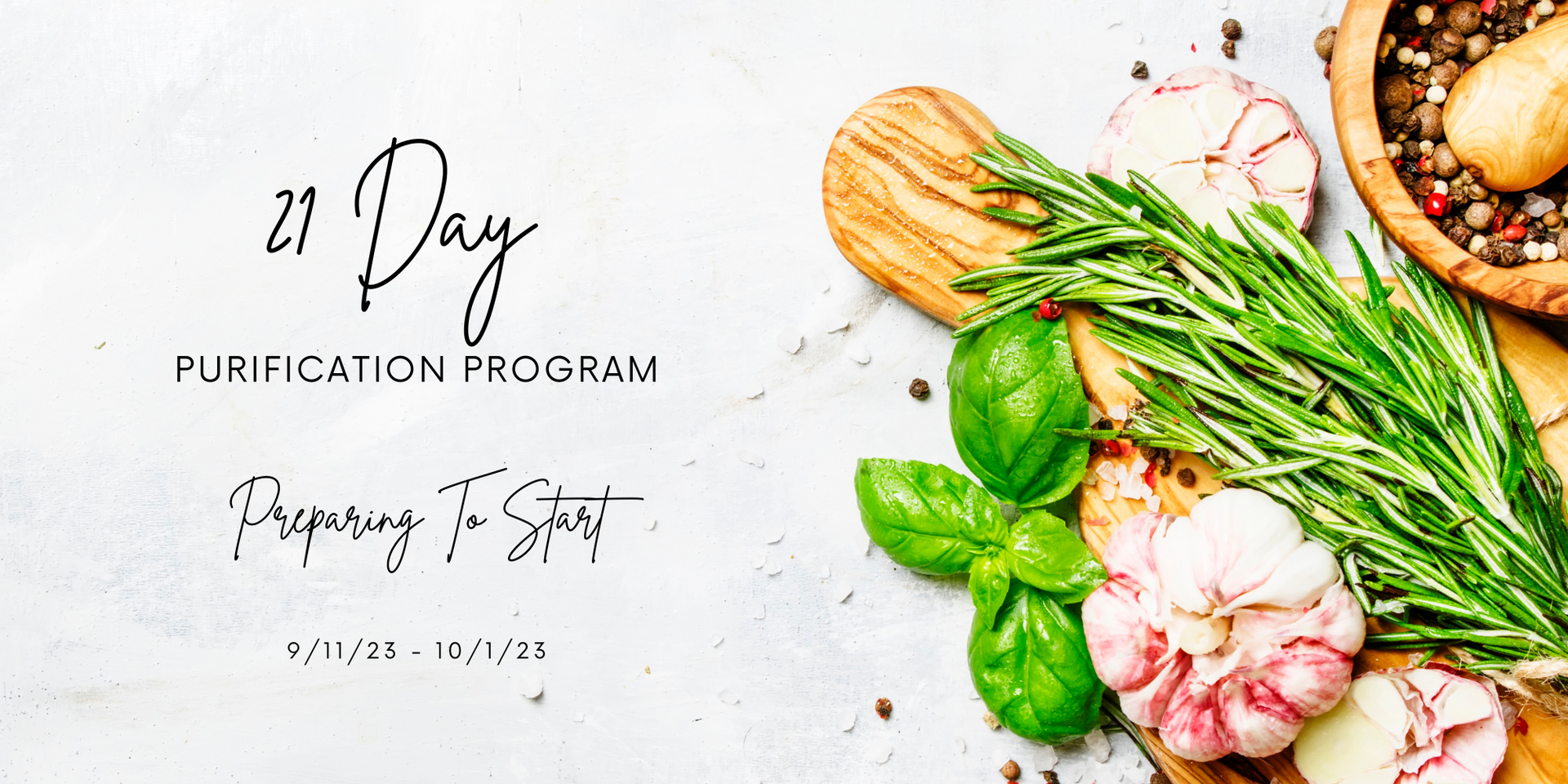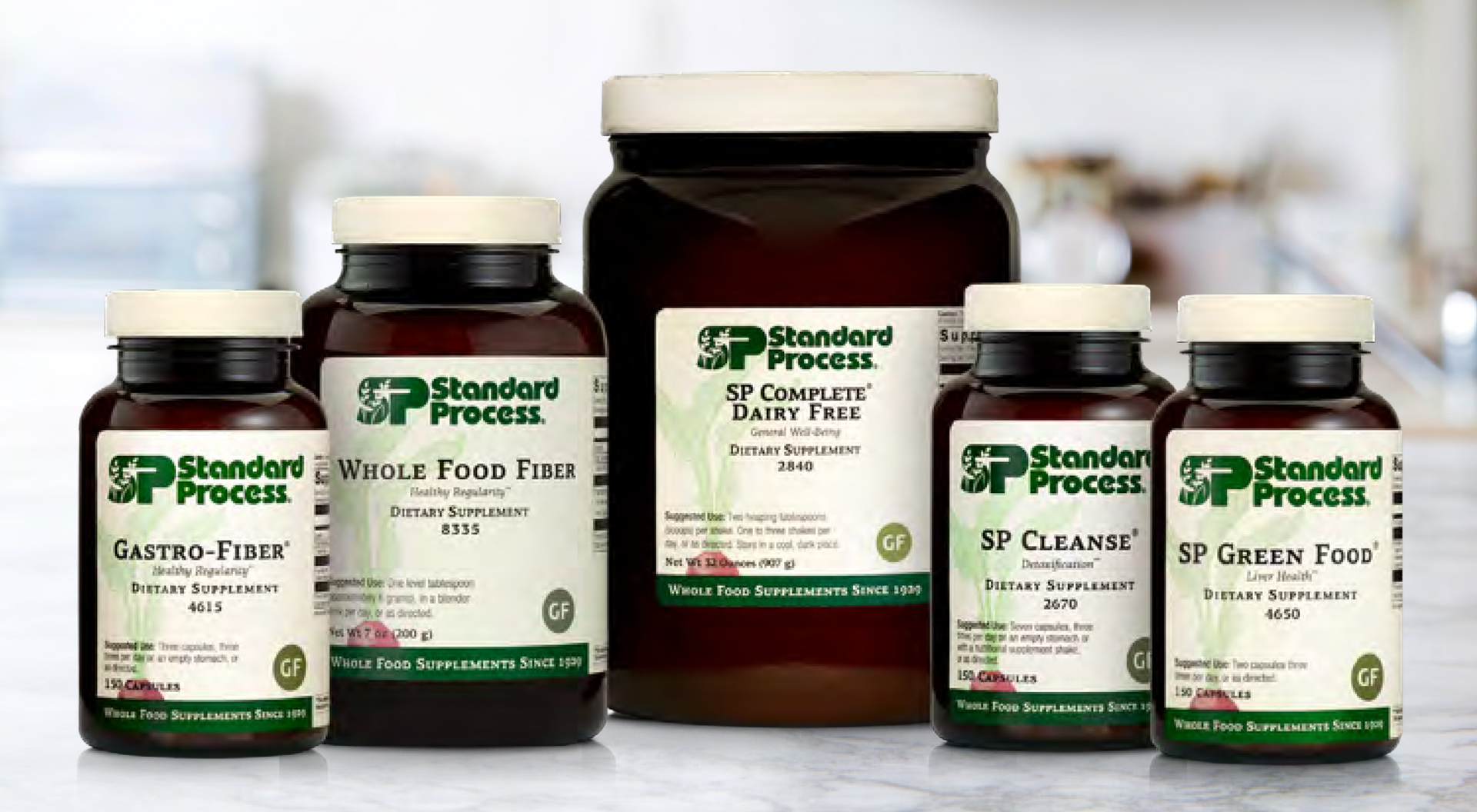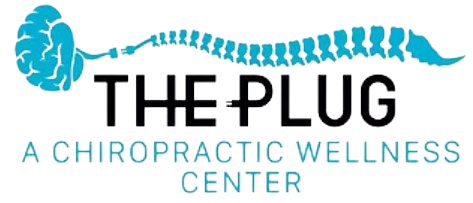Blog

September 6, 2023
Hello friends! I am excited for you all to join me with the 21 Day Purification Program. As I discussed in an earlier blog post, this program is much more than a cleanse or detox! Its ultimate goal is to help foster healthy lifestyle habits including physical activity and healthy food choices. Below, I will outline and paraphrase the 6 key changes that foster healthy eating habits as discussed in One Degree of Change by former Standard Process Wellness Chiropractor, Georgia Nab, DC. The 6 Key Changes are as follows: Learn about foods for good health Foods should be as close to their original form as possible. (example - instead of fruit juices, eat the fruit). Buy organic when possible. Stick to the foods in the purification grocery lists and stock up on non-perishable and frozen items to ensure you are successful with the program. PREPARE PREPARE PREPARE. During the program, preparation is key! It will help you avoid binging, making poor choices, and decrease hunger cravings. When shopping, make sure to read labels and stay away from the below ingredients. Remove bad fats, and replace them with good fats Avoid processed fats and trans fats. Use the acronym “BACON” for healthy fats. Clarified Butter (GHEE), Avocado (and oil), Coconut (oil, milk, and cream), Olives (and oil), and Nut oils (excluding peanut oil). It is important to not overheat oils when cooking or it will turn good fats rancid or sour. Avocado and Coconut oil are high heat oils and can be used for frying . GHEE and Olive oil are medium to low heat oils that are better for quick frying in pans. The best sources of Omega 3s are fatty fishes such as salmon, trout, sardines, mackerel, and tuna. Other healthy fat sources include flaxseed oil, flax oil, hemp oil, and grape seed oil (all raw and unrefined or expeller pressed). Change the meat you eat Ensure healthy fatty acid ratios, ideally we would like less than 6:1 Omega 6 to Omega 3 ratios. Grass fed cows and free range chickens have 4:1 ratios. Ideal protein choices come from grass-fed, free-range, cage-free, organic sources as well as wild game and wild caught fish. Other options include pea proteins and whey proteins if you can tolerate dairy. Replace and reduce sugars This will help you reduce refined sugars in your diet. Overconsumption of sugars are linked to numerous metabolic and endocrine conditions including type 2 diabetes, obesity, and heart disease. Natural alternatives for sugars are stevia, medjool dates, monk fruit sweetener, bananas, and raw, local honey. Replace grains with pseudo grains Many grains are highly processed and cause gut dysbiosis or digestive disorders. Soy and corn grains are typically genetically modified and are high inflammatory. Overconsumption of grains can lead to insulin dysregulation. Healthier and preferred pseudo-grains include quinoa, buckwheat, teff, millet, amaranth, and wild rice. Drink more water The benefits of water are numerous! It is important to stay hydrated as our bodies are made up of over 60% of water and this helps our kidneys function properly, supports healthy skin, healthy digestion and bowel movement, lung functioning, cognitive functioning and supports energy levels. A good rule of thumb is to drink half your body weight in ounces. Ingredients To Avoid: High fructose corn syrup Trans fats (shortening, partially hydrogenated, or hydrogenated) Artificial flavors Monosodium glutamate (MSG) Artificial colors/food colorings Artificial sweeteners Aspartame Sucralose Neotame AceK Saccharin Preservatives Tert-butlhydroquinone (TBHQ) Polysorbates Butylated hydroxytoluene (BHT) Butylated hydroxyanisole (BHA) Sodium benzoate Benzoic acid Added nitrates and nitrites Propyl gallate Potassium Bromate Phosporic acid Hyrdolyzed vegetable protein Dr. Chohnice Daniels, DC, MS, FIAMA

August 18, 2023
Clearer - Brighter - Lighter. Your life in high resolution! The Standard Process Purification Program helps your body purify and rebuild itself from the inside out. The program gives you a structured plan for purifying, nourishing, and maintaining a healthy lifestyle. Along with Standard Process supplements, you’ll support your major organ systems with the vitamins, minerals, and other nutrients found in whole foods. In addition, this program supports the maintenance of healthy weight when combined with a healthy lifestyle. When you’ve completed the 21-day purification program, you’ll be amazed at how good you feel. You’ll learn how to transition to a new, healthful way of eating that will continue your journey toward a clearer, brighter, lighter way of life now and in the years ahead. - Charles C. Dubois(Standard Process President & CEO) What is purification? Purification, also known as detoxification, can help you remove natural toxins from your body and help maintain a healthy weight. We are exposed to external toxins on a daily basis. These include pollutants, pesticides, and chemicals. Internally, our bodies produce waste byproducts as a result of normal metabolic function. Although your body is designed to rid itself of these toxins naturally, it can become overburdened . Purification offers your body additional support to expel and metabolize these toxins and manage weight, which is important to maintaining your health and vitality. Toxins can contribute to a wide range of conditions: Stuffy head Fatigue or difficulty sleeping Indigestion or other temporary gastrointestinal upset Food cravings or weight gain Reduced mental clarity Low libido Skin issues Joint discomfort How do I determine my toxic load? Your toxic load is the amount of toxins that your body must process. Answer the following basic toxicity questionnaire with either ‘yes’ or ‘no’ for an idea of your toxic load. Do you or have you eaten processed foods? Do you eat non-organic fruits and vegetables? Do you eat meat that is not organic? Do you or have you ever used artificial sweeteners? Do you drink soda? Do the foods you eat have preservatives, additives, or sweeteners added? Do you eat fast foods and/or eat out regularly? Do you charbroil or grill foods? Do you drink coffee regularly? Do you drink alcohol? Do you drink tap water? If the majority of your answers are “yes,” then it is likely that your diet contributes significantly to your toxic load. Beyond diet, many external toxins — such as personal care products, cleaners, and pollution — add to your load. Upon showing interest in this 21 day program, you will be required to submit a complete toxicity questionnaire. If you would like to see your toxicity status now, please download the toxicity questionnaire here . Program Basics The 21-day purification program includes eating whole, organic and unprocessed foods and eliminating foods that may cause a concern in some individuals; taking supplements with whole foods and other ingredients; and drinking plenty of water. You will eat a variety of vegetables and fruit for the first 10 days, with select proteins added on day 11. For more information, please download the 21 day purification program guide here . Please note that our program will offer all varieties of the SP Complete and ONLY the gastro fiber supplement option. Reminders: All orders for the 21 day program must be placed by September 1st. The cut off time is noon. There will be two workshops at our office (September 6th at noon and 6 pm) to pick up your supplements and learn more about the program and the group. You must attend one of the workshops. The cost of the 21 day kit is $297 + tax. This includes all necessary supplements and a TPC (The Plug Chiropractic) T-shirt Our office will be raffling off 1 full Purification Kit at the HOTWORX Asheville Grand Opening and 1 year Celebration of August 31st. To learn more, click here . Are you ready to get started? Click the button below or give us a call today at 828-242-1369. If you would like more information, please fill out the form below!
By websitebuilder
•
February 14, 2022
3X4 Genetics offers a personalized plan that gives you insights that help you understand your health better, with clear and actionable recommendations to help you improve your quality of life. It’s not invasive at all, it only requires a cheek swab that takes 60 seconds. Why the 3X4 Genetic Blueprint? Your genes are unique. They tell the story of you, and only you; no one else has ever had the same genetic makeup. That’s awesome, because instead of having to do what works okay for most, you can
We'd love to hear from you!
Contact Details
Phone: 828-242-1369
Email: info@theplugchiropractic.com
Address: 485 Hendersonville Rd, Ste 5
Asheville, NC 28803
Conveniently located 2 mins from I 40, across from Atlanta Bread Co., in the same plaza as Apollo Flame.
Business Hours
- Mon - Wed
- - -
- Thursday
- Closed
- Fri - Sat
- -
- Sunday
- Closed





Contact Details
Phone: 8282421369
Email: info@theplugchiropractic.com
Address: 485 Hendersonville Rd, Ste 5
Asheville, NC 28803
Conveniently located 2 mins from I 40, across from Atlanta Bread Co., in the same plaza as Apollo Flame.
Business Hours
- Mon, Wed
- - -
- Tuesday
- - -
- Thursday
- -
- Friday
- -
- Sat - Sun
- Closed





Content, including images, displayed on this website is protected by copyright laws. Downloading, republication, retransmission or reproduction of content on this website is strictly prohibited. Terms of Use
| Privacy Policy
